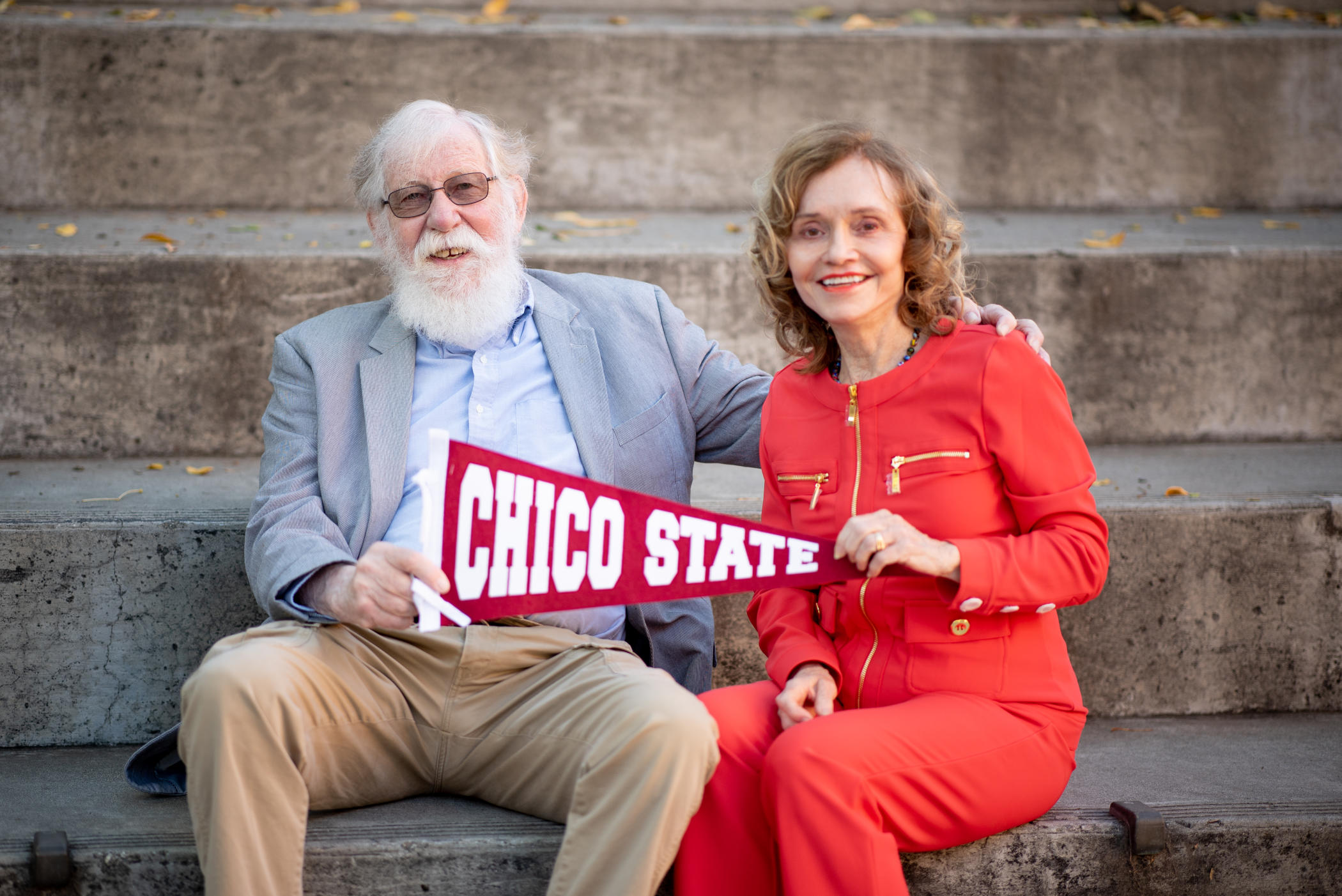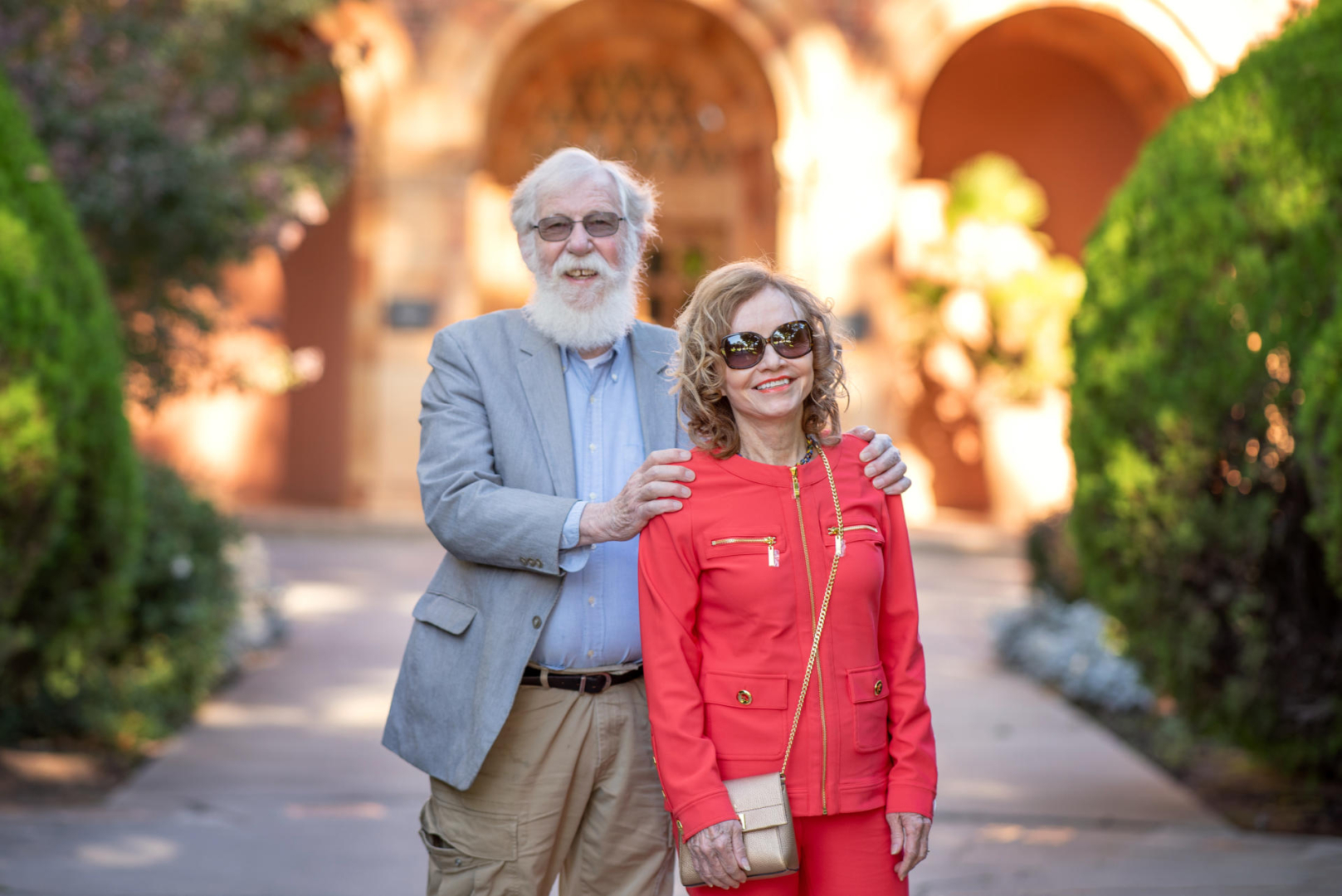Retired Faculty Support Student Success with Estate Gift

Frederica Shockley (right) and Jon Ebeling (left) are photographed on campus on Friday, September 25, 2020 in Chico, Calif. (Jessica Bartlett/University Photographer/CSU, Chico)
Neither Jon Ebeling nor Fredericka Shockley knew what they were in for when they relocated to California in the 1970s for jobs at Chico State—they were simply looking for a career path.
Instead, they found rewarding professions in teaching, made countless friends, inspired generations of students, and ultimately, met the loves of their lives—each other. Now retired, the professors emeriti are thinking about how their legacies might live on and how they can continue to support their disciplines and students for decades to come.
“The University has always been very important to us,” Shockley said. “It’s been our family because we don’t have any children or have family nearby.”
With that in mind, the two have designated Chico State as the beneficiary of their estate, providing financial support in perpetuity for the Department of Economics and the Department of Political Science and Criminal Justice.
Ebeling came to Chico State in 1971, shortly after completing his PhD at the University of Pittsburgh. For the next 27 years, he would teach statistics and public finance—specializing in revenue forecasting, evaluation research, and public opinion research—and advised more than 200 students through their graduate degrees in the Department of Political Science and Criminal Justice.
Shockley arrived in 1978, after finishing her doctorate at Georgia State University. Looking for a warmer climate to call home, she was attracted by the campus, friendly demeanor of faculty in the Department of Economics, and an opportunity to both teach and conduct research. For 37 years she would teach microeconomics, managerial economics, urban economics, public finance, and the economics of war. She served as chair of the department from 1987–97 and from 2010–15.
It wasn’t long after her arrival that their two worlds collided—at a Butte Hall copy machine. Shockley was working on the sixth floor and Ebeling on the seventh, and he asked her to lunch to encourage her to join the United Professors of California, the faculty union at the time. They eventually began dating and married in 1986.
“Jon had an entertaining personality and an inquisitive mind,” she said. “And he was good in statistics and computing.”
He was attracted to her intellect, and they shared an interest in photography, jazz, and traveling—hobbies that have sustained them for decades since.

Reminiscing about their time at Chico State, they relish memories of being innovators on campus. Ebeling made some of the early forays into using computers for statistics, and during the early 1990s, Shockley began experimenting with a paperless classroom and introduced many computing applications into her classes. In 1994, one of her students put together a server, Rocko, from leftover parts in the computer lab, that allowed economics students and faculty to use e-mail and classroom computing applications.
With that experience, Shockley’s students gained the most timely and relevant skills to go on to be successful in their careers, and Ebeling’s students led the way with their computer-based statistics experience. That’s exactly the kind of outcome they are hoping for with their estate gift—to ensure their beloved departments continue to teach students the most relevant elements within their fields and give the hands-on experience graduates need to thrive as soon as they enter the job market.
“I often hear how people are doubting the value of a college degree,” Shockley said. “We want them to get the skills they need to get the job.”
Another goal for their gift is for it to support academic advising on career opportunities. The funds could also support scholarships to give students financial support so they can take on internships or focus more deeply on their studies instead of worrying about how to pay for college.
Ebeling said he is particularly interested in support of low-income students because it resonates with his own background. His father passed away when he was only a year old, and his mom raised him and his brother alone. He struggled a lot in elementary and high school, and it wasn’t until he worked a few manual labor jobs at a meatpacking plant and a gas station that he decided to better his life with a college degree.
Both he and Shockley agree that a college degree—especially in the dynamic and wide-ranging fields of economics and political science—provide real opportunities for social mobility and to transform students’ lives.
Through their years in academia and retirement, they said watching students move on to rewarding and impressive careers is perhaps one of the greatest joys of a career in higher education. Among Ebeling’s most memorable students are Congressman Mike Thompson (Public Administration, ’82; MPA, ’96), who defended his thesis in their living room, and Scott Tandy (MPA, ’73), the retired chief administrative officer of Contra Costa County—both of whom he stays in touch with.
Shockley keeps tabs on her former students, as well as today’s economics grads, with a website she steadfastly maintains even in retirement. Through it, she celebrates the careers of alumni like Jessica Zotz (Economics, ’10), who is a strategic sourcing manager for Ross, Inc.; John Spade (Economics, ’95), the chief information officer for the Florida Panthers; and Mitch Ferguson (Economics, ’92), a foreign service officer with the US Department of State.
“I have known Dr. Shockley and Dr. Ebeling for many years, admiring them both for their unwavering dedication to the wellbeing and success of their students. That dedication has not diminished, even long after they retired. Their work and dedication has benefited literally hundreds of students, and their estate gift will ensure future students will continue to benefit from their generosity and commitment to student success,” said Dean Eddie Vela. “Freddie and Jon have retired, yes, but they did so leaving Chico State better than how they found it. What more can be asked of any of us?”


